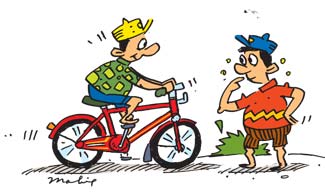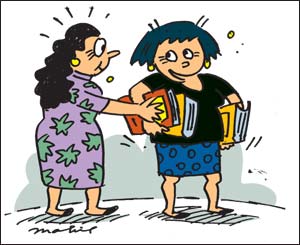|

by R. S. Karunaratne
How to use
'have'
and 'have got'
'Have' and 'have got', more or less,
have the same meaning: possess or own.
Kumar has got a new bicycle.

Kumar has a new bicycle.
Anupama has got two brothers.
Anupama has two brothers.
Mother has got a headache.
Mother has a headache.
There are two possible forms in
questions.
Have you got a pen?
Do you have a pen?
Have you got a car?
Do you have a car?
Has he got a bicycle?
Does he have a bicycle?
Have they got tickets?
Do they have tickets?
Similarly, there are two possible
forms in negative sentences.
You haven't got a pen.
You don't have a pen.
You haven't got a car.
You don't have a car.
He hasn't got a bicycle.
He doesn't have a bicycle.
They haven't got tickets.
They don't have tickets.
When 'have' is used to mean 'possess'
it is not correct to use the continuous forms.
So, we say:
I have a headache.
You have a headache.
She has a headache.
They have several vehicles.
To indicate the past, we use 'had':
I had a headache.
You had a headache.

She had a headache.
They had several vehicles.
Note: We usually do not use 'got'
with 'had'.
Mary had long hair when she was young.
(Mary had got long hair... is non standard.)
When forming past questions, use 'did':
Did you have long hair when you were young?
Did she have a headache a little while ago?
Did they have so much of money?
Use 'didn't' for question tags.
Amanda had two dictionaries, didn't she?
You had a lot of hair, didn't you?
They had many shops, didn't they?
Use 'have' in the following
situations.
I have breakfast at 8 am.
She has lunch at the canteen.
We have dinner at home.
Have a cup of coffee.
I have a bath every other day.
Let's have a rest now.
Have a nice time!
Let me have a look at your book.
'Have got' cannot be used in the
above situations.
Multiple
choice questions
Multiple choice questions or MCQs are quite popular in modern
examinations. Read the following sentences and tick off the word or
words nearest in meaning to the words in bold.
1. We do not respect a man who has
betrayed his country.
A. spy
B. pirate
C. traitor
D. dictator
2. The child gave a sudden shout in a
loud, high voice.
A. moan
B. sigh
C. grunt
D. shriek
3. All his actions were concerned
with making money.
A. mercenary
B. grasping
C. grabbing
D. monetary
4. He was my friend and trusted
adviser.
A. psychiatrist
B. mentor
C. employer
D. boss
5. The words `shut' or `close' have
the same meaning.
A. synonymous
B. anonymous
C. opposites
D. antonyms
6. The wise man's thirst for knowledge is
impossible to satisfy.
A. indomitable
B. impregnable
C. insatiable
D. audible
7. This tree belongs to a type that
loses its leaves every year.
A. barbarous
B. coniferous
C. evergreen
D. deciduous
8. The speaker's remark is capable of
being interpreted in two different ways.
A. arduous
B. ambiguous
C. hilarious
D. vociferous
9. Dickens and Thackeray were two
writers who lived at the same time.
A. playwrights
B. journalists
C. novelists
D. contemporaries
10. She was able to write equally
well with both hands.
A. ambidextrous
B. competent
C. literate
D. fluent |

